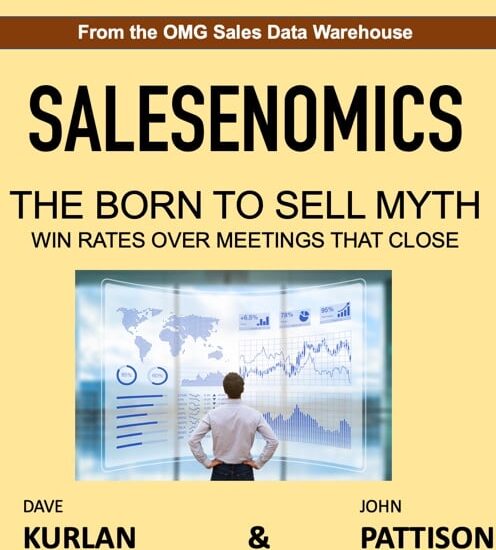-
The New Salesenomics
- May 24, 2019
- Posted by: Kurlan & Associates, Inc.
- Category: Understanding the Sales Force

-
Data Shows 1st Year Sales Improvement of 51% in this Competency
- September 18, 2018
- Posted by: Dave Kurlan
- Category: Understanding the Sales Force

I looked at the before and after scores for eight of the 21 Sales Core Competencies as well as the Reaches Decision Makers, Account Manager and Farmer competencies for a total of 11. See the table below:
-
How to Achieve Short-Term Explosive Growth from your Sales Team
- September 14, 2018
- Posted by: Dave Kurlan
- Category: Understanding the Sales Force

Explosive Growth. Positive Momentum. Better Morale. Greater Confidence. Improved Capabilities.
Wouldn’t you just love using those phrases to describe your sales force?
We know from the data in this article that according to Objective Management Group (OMG), sales managers who spend at least 50% of their time coaching have salespeople who are 28% more effective.
We know from OMG’s data in this article that sales managers who are effective at coaching have salespeople who are 16% more effective.
And we know from the same data that sales managers who spend at least 50% of their time coaching AND are effective at coaching have salespeople who are 49% more effective.
That’s 49% more effective!
So what would a 49% bump mean to you and your company and what will it take to get there?
-
Finally! Science Reveals the Actual Impact of Sales Coaching
- September 7, 2018
- Posted by: Dave Kurlan
- Category: Understanding the Sales Force

You must have heard the joke that 73.6% of statistics are made up!
I have read and even reported that sales leaders who coach their salespeople see a boost in revenue of around 27%. It sounds like a realistic number but I have not seen any science to back it up. Until now. Check this out!
-
New Data Shows That Elite Salespeople are 700% Less Likely to Do This
- August 20, 2018
- Posted by: Dave Kurlan
- Category: Understanding the Sales Force

How effective are salespeople when it comes to creating urgency? I’m not talking about salespeople who create urgency by telling their prospects that if they don’t order today the price will go up or it won’t be available. I’m talking about salespeople who create urgency by asking questions to uncover problems, the consequences and cost of which, create urgency.
-
Elite Salespeople are 200% Better in These 3 Sales Competencies
- July 23, 2018
- Posted by: Dave Kurlan
- Category: Understanding the Sales Force

Professional athletes have one trait in common – they are all very athletic and their skills are among the top several hundred in the world in their particular sport. For example, in Major League Baseball, there are 30 teams with 25 players each, making those ball players the top 750 in the world. Dig a little deeper and in each sport there is an even smaller subset of players who are all-stars
-
Latest Data – Strong Salespeople Score 375% Better Than Weak Salespeople
- July 18, 2018
- Posted by: Dave Kurlan
- Category: Understanding the Sales Force

Some of you might have seen Bryce Harper’s incredible last-minute barrage of home runs in the 2018 All-Star game. It’s one of the highlights of summer! Today I give you a barrage of my own with three killer videos and a powerful data-packed article.
-
Sales Pipeline Data Shows That Most Late Stage Opportunities Just Aren’t
- July 11, 2018
- Posted by: Dave Kurlan
- Category: Understanding the Sales Force

If you happened to read the article about most salespeople being fired or arrested if they worked in accounting then this is the sequel – Arrested 2!
-
Latest Data Shows Most Salespeople Would be Fired or Arrested if they Worked in Accounting
- July 2, 2018
- Posted by: Dave Kurlan
- Category: Understanding the Sales Force

In this article, we will look to determine whether there is a correlation between sales percentile, sales pipeline and sales performance. And as has been the case with the last ten articles like this, the data is sure to surprise.
OMG includes a pipeline analysis as part of every Sales Force evaluation it conducts. We ask each salesperson 19 questions about four late-stage, proposal-ready/closable opportunities currently in their pipeline. In the table below, the percentage of salespeople who actually had 4 late-stage opportunities on which they could report are sorted by Sales Percentile.
-
The Latest Data Shows That Sales Managers Are Even Worse Than I Thought
- June 18, 2018
- Posted by: Dave Kurlan
- Category: Understanding the Sales Force

Today we’re diving into sales management and specifically, the Sales Management Coaching Competency. What you read will surely disappoint and shock you and might even cause you to puke in disgust.

